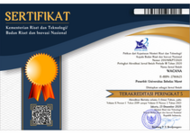New Normal, New Solidarity: Strategi Berdaya Melalui Self-Compassion dan Solidarity Buying Selama Pandemi Covid-19
Abstract
The social distancing program causing the country's economic condition to worsen during pandemic. Solidarity buying getting more popular, which is defined as the practical value of social solidarity and defined as a situation between individuals and or groups based on shared moral feelings and beliefs that are strengthened by shared emotional experiences. One of the factors that encourage someone to want to help others is self-compassion. This study aims to find out empirically how self-compassion behavior plays a role in the formation of solidarity buying and identify solidarity buying during pandemic. This study will use a mixed method, with a 10-item self-compassion likert scale and a 10-item solidarity buying scale as well as qualitative using open-ended questions. The data collection strategy will use a congruent embedded strategy. Total subjects involved is 116 subjects with criteria with experience as non-supermarket customer. The results showed self-compassion had a significant effect on solidarity buying behavior of 11.2% (p <0.01) with a unidirectional relationship. Strategy in solidarity buying behavior is carried out online through free delivery services and the majority of product information is obtained from broadcast messages through short message applications. The pandemic situation has fostered a sense of shared destiny.
Keywords
Full Text:
PDF (Bahasa Indonesia)References
Barbera, F., Dagnes, J., & Di Monaco, R. (2020). Participation for what? Organizational roles, quality conventions and purchasing behaviors in solidarity purchasing groups. Journal of Rural Studies, 73(November), 243–251. https://doi.org/10.1016/j.jrurstud.2019.10.044
Brophy, Kyla; Brähler, Elmar; Hinz, Andreas; Schmidt, Silke; Körner, A. (2020). The role of self-compassion in the relationship between attachment, depression, and quality of life. Journal of Affective Disorders, 260(1), 45–52.
Creswell, J. W. (2014). Research Design: Pendekatan Kualitatif, Kuantitatif dan Mixed. Pustaka Pelajar.
Darmadi. (2014). Metode Penelitian Pendidikan dan Sosial. Alfabeta.
Demirci, I., Eksi, H., & Eksi, F. (2019). Narcissism, life satisfaction, and harmony: The mediating role of self-esteem and self-compassion. Eurasian Journal of Educational Research, 2019(84), 159–178. https://doi.org/10.14689/ejer.2019.84.8
Durkheim, E. (1989). Sosiologi dan Filsafat. Erlangga.
Fredrickson, B. (2009). Positivity. Publishing Group.
Hess, J. (2020). Towards a (Self-)Compassionate Music Education: Affirmative Politics, Self-Compassion, and Anti-Oppression. Philosophy of Music Education Review, 28(1), 47–68. https://doi.org/10.2979/philmusieducrevi.28.1.04
Ismawati, E. (2012). Ilmu Sosial Budaya dasar. Ombak.
Kementerian Keuangan. (2021). KEMENKEU TANGGAP COVID-19: Informasi Terkini. Website.
Kotler, P., & Keller, K. L. (2012). Marketing Management. Pearson Education.
Martin, R. D., & Kennett, D. J. (2018). To be kind or not to be kind: The moderating role of self-compassion in the relationship between general resourcefulness and academic self-regulation. The Journal of Social Psychology, 158(5), 626–638. https://doi.org/10.1080/00224545.2017.1407286
Muris, P., Otgaar, H., Meesters, C., Heutz, A., & van den Hombergh, M. (2019). Self-compassion and Adolescents’ Positive and Negative Cognitive Reactions to Daily Life Problems. Journal of Child and Family Studies, 28(5), 1433–1444. https://doi.org/10.1007/s10826-019-01353-4
Neff, K. D. (2003). The Development and Validation of a Scale to Measure Self-Compassion. Self and Identity, 2, 223–250. https://doi.org/https://doi.org/10.1080/15298860309027
Neff, Kristin D., & Vonk, R. (2009). Self-compassion versus global self-esteem: Two different ways of relating to oneself. Journal of Personality, 77(1), 23–50. https://doi.org/10.1111/j.1467-6494.2008.00537.x
Robertus, R. (2013). Altruisme, Solidaritas dan Kebijakan Sosial. Jurnal Sosiologi MASYARAKAT, 18(1), 1–18.
Saidang, S., & Suparman, S. (2019). Pola Pembentukan Solidaritas Sosial dalam Kelompok Sosial Antara Pelajar. Edumaspul: Jurnal Pendidikan, 3(2), 122–126. https://doi.org/10.33487/edumaspul.v3i2.140
Septania, S., & Proborini, R. (2020). Self-Compassion, Grit dan Adiksi Internet pada Generasi Z. Analitika, 12(2), 138–147. https://doi.org/10.31289/analitika.v12i2.4175
Septania, S., & Saputra, R. (2020). Self-Compassion, Grit dan Positive Affect Sebagai Prediktor Kebersyukuran Mahasiswa Penerima Bidik Misi. Majalah Ilmu Pengetahuan Dan Pemikiran Keagamaan Tajdid, 23(1), 76–86. https://ejournal.uinib.ac.id/jurnal/index.php/tajdid/article/view/1696
Zhang, Huaiyu; Watson-Singleton, Natalie N.; Pollard, Sara E.; M. Pittman, Delishia; Lamis, Dorian A. ; Fischer, Nicole L.; Patterson, Bobbi; Kaslow, N. J. (2017). Self-Criticism and Depressive Symptoms: Mediating Role of Self-Compassion. OMEGA: Journal of Death and Dying, 80(1), 202–223. https://doi.org/https://doi.org/10.1177/0030222817729609DOI: https://doi.org/10.20961/wacana.v14i2.56154
Refbacks
- There are currently no refbacks.
Copyright (c) 2022 Sovi Septania, Sulastri Sulastri, Tansri Adzlan Syah

This work is licensed under a Creative Commons Attribution-ShareAlike 4.0 International License.
Jurnal WACANA
Fakultas Psikologi Universitas Sebelas Maret (UNS)
Gedung D Fakultas Psikologi
Jl. Ir. Sutami 36A Kentingan, Jebres, Surakarta Jawa Tengah 57126
email : wacana@mail.uns.ac.id






